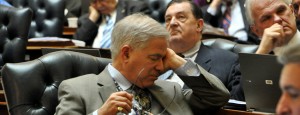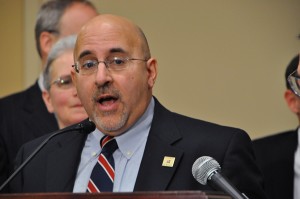Local
‘Strategic blunder of monstrous proportions’
Insiders rip HRC, Gill decision to cancel Maryland vote on marriage
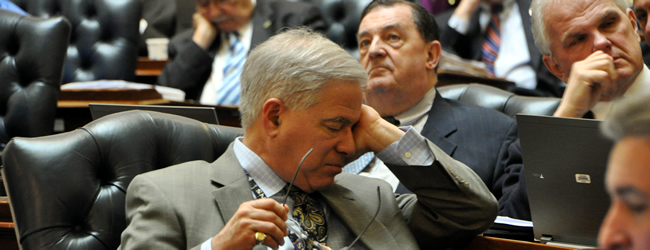
The decision to cancel a March 11 vote on a same-sex marriage bill in the Maryland House of Delegates was a mistake that could hurt rather than help the chances for passing the bill within the next several years, according to Maryland-based advocates who lobbied for the bill.
The advocates who expressed this view, some of whom spoke on condition that they not be identified, said at least four national LGBT groups put pressure on lawmakers through Equality Maryland, the statewide LGBT group, to withdraw the bill rather than risk a losing vote.
One of the advocates called the national groups and their political operatives who came to Maryland to lobby for the bill well intentioned but unfamiliar with the nuances and “rhythms” of the Maryland Legislature.
“I think this was a strategic blunder of monstrous proportions,” said Mark McLaurin, political director of Maryland’s Local 500 of the Service Employees International Union (SEIU), which lobbied for the bill.
McLaurin, a gay man who has lobbied the Maryland Legislature for progressive causes for more than 15 years, said many insiders familiar with the legislature don’t think a losing vote by a close margin would hurt the bill’s chances in the future.
On the other hand, McLaurin and others who favored taking a vote on the marriage bill said the legislature has a history of not taking up highly controversial bills two years in a row. McLaurin said he fears that the bill won’t come back for a vote until 2015, even though Speaker of the House Michael Busch (D-Anne Arundel County) said he would try to bring the measure back in 2012.
Busch said supporters appeared to fall just a few votes shy of the 71 votes needed to pass the bill in the 141-member House. However, he said wavering delegates might have chosen to vote “yes,” raising the possibility that the bill could have passed.
Several knowledgeable sources, who spoke on condition of anonymity, agreed with McLaurin’s assessment.
“Gill and HRC decided it was detrimental to the larger movement to have the vote go down,” one source said. “Gays and lesbians in Maryland deserved a debate and a vote on legislation that we waited years for.”
Another source criticized Busch’s handling of the bill.
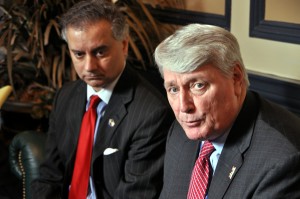
Maryland House of Delegates Majority Leader Kumar Barve and Maryland House Speaker Michael Busch (Washington Blade photo by Michael Key)
“[Speaker Michael] Busch could have squeezed harder but didn’t. This is a new House of Delegates and this man didn’t bother to take the temperature of the new House of Delegates. I was shocked. I thought House leadership was more strategic, intelligent and powerful than this and it all evaporated.
“God forbid we put our swing vote Democrats on the line to take a vote for our families. Or maybe the Speaker has lost control of his chamber.”
There was also criticism of Gov. Martin O’Malley, who the sources faulted for not taking a more public stand in support of the bill.
“O’Malley stopped by Friday for a photo op with marriage supporters,” one source said. “What a vacant gesture at the 11th hour. You couldn’t write an op-ed the week before?”
The Civil Marriage Protection Act won approval in the Maryland Senate earlier this month. It died last Friday for at least this year when the House of Delegates approved by voice vote a motion to send it back to committee.
All of the bill’s sponsors, including seven openly gay members of the House of Delegates, appeared to support the motion, a development that stunned LGBT activists watching the proceedings from the visitors’ gallery.
The motion to recommit the bill to committee came after supporters and opponents engaged in an emotional, two-and-a-half hour debate over the bill. Most of the activists for and against the bill watching from the galleries didn’t know that the bill’s sponsors had decided beforehand to cancel the vote.
McLaurin said he learned from those attending strategy meetings that the eight-member LGBT Caucus of the legislature was divided over whether to postpone the House vote.
The caucus includes Sen. Richard Madaleno (D-Montgomery County), and House of Delegates members Maggie McIntosh, Mary Washington, and Luke Clippinger, each Democrats from Baltimore; Heather Mizeur, Bonnie Cullison, and Anne Kaiser, each Democrats from Montgomery County; and Peter Murphy, a Democrat from Charles County.
Spokespersons for Equality Maryland, the statewide LGBT group that led the lobbying effort for the bill, and officials with the national groups Freedom to Marry and Human Rights Campaign defended the decision to withdraw the bill.
They said the decision was made jointly by the bill’s lead sponsors, including the one gay male and six lesbian delegates, who determined it was better to postpone the vote than to risk a losing vote, which they said would be perceived as a defeat.
“This is a strategic effort to give ourselves more time to make the case and win,” said Evan Wolfson, executive director of Freedom to Marry. “And all of us believe we can win. It’s just a matter of nailing down the votes and getting there.”
HRC spokesperson Fred Sainz said the decision to cancel the vote came after it became clear that supporters didn’t have the votes to pass it.
“This was a shared decision by all the stakeholders – Equality Maryland, the state’s LGBT Caucus, Gill Action, Freedom to Marry, and HRC,” he said. “It was the consensus belief that the best way to win marriage in Maryland was by a delay and not by losing a vote.”
Officials with Gill Action, a philanthropic group founded by gay businessman Tim Gill in Colorado that funds LGBT rights causes, did not return a call seeking comment.
An official with the Gay & Lesbian Victory Fund, Robin Brand, also pushed for postponing the vote, activists familiar with the legislature said. Brand told the Blade she discussed the issue with the gay delegates in the Victory Fund’s role of working with openly gay elected officials. She said she left it up to them to decide on whether or not a vote should be taken.
McLaurin, a former member of the Equality Maryland board, said the advocates who wanted the vote to go forward believe it would have been worth “a roll of the dice” to determine if supporters had the 71 votes needed to pass the bill.
“In the worst case scenario we would have come up two or three votes short,” he said. “And I think that a loss by two or three votes would be much more galvanizing to the community of supporters that we’re going to need to rally and accomplish this goal.”
McLaurin added, “Either way it was going to get billed as a failure. I’d rather have on record who’s with us and who’s against us.”
Another former Equality Maryland board member, David Toth, wrote in a Facebook posting that the group was deleting messages left on its own Facebook page that were posted by a large number of supporters who expressed outrage over the decision not to have a vote on the bill.
“Anyone who is asking questions of EqMD or its staff is having their posts deleted like crazy,” he wrote. “After donating thousands of dollars and working on the board for over six years I simply find this appalling.”
Wolfson of Freedom to Marry cautioned that a public fight over the decision not to have a vote could hurt efforts to bring the bill back next year.
“This is a temporary pause in the voting and it’s not a pause in the work,” he said. “So we don’t need finger pointing and recriminations, we need redoubling the effort to win.”
Although Equality Maryland, led by executive director, Morgan Meneses-Sheets, was billed as the lead organization calling the shots, insiders say field workers from the national groups like Freedom to Marry, HRC and Gill Action Fund far outnumbered Equality Maryland’s staffers working the halls of the legislature in Annapolis.
It was the national groups, rather than Equality Maryland, that had the ear of supportive lawmakers, including the LGBT Caucus members, during the days leading up to the scheduled vote on the bill in the House, McLaurin and other insiders said.
In a March 10 e-mail sent to LGBT Caucus members and other lawmakers supporting the bill, representatives of Freedom to Marry, Gill Action and HRC urged the lawmakers to postpone the vote.
“With the rights of so many Marylanders on the line, we wanted to flag our serious concern about going to a floor vote tomorrow when it’s not been confirmed we have 71 votes,” the e-mail says. “Various counts have us at 69 or 70 but not 71 or beyond.”
The e-mail adds, “The decision on whether to ask the leadership to move forward or postpone the vote rests with our openly LGBT legislators and other sponsors (in consultation with EQMD) who know their colleagues far better than we do, and who have so courageously led the way.”
The e-mail was signed by Bill Smith and Sarah Vaughn, national political director and deputy political director of Gill Action; Marty Rouse and Sultan Shakir, the lead officials at HRC’s field office; and Marc Solomon, national campaign director for Freedom to Marry.
In a separate e-mail sent the next day to most of the same people, HRC’s Rouse warned of serious political consequences if a vote on the marriage bill were to be taken.
“I plead with you to please delay this vote,” he said. “It would be devastating to suffer a huge loss. There will be vitriol and pain that may take years to soothe.”
Rouse said he also feared that a losing vote would damage relationships between the LGBT community and lawmakers who voted against the bill.
“I am sure that relationships are already frayed, but, if there are impassioned speeches on the floor, and tears shed, and we still lose, those relationships will be damaged even more. The air in the chamber will be toxic for months if not years,” he said.
McLaurin said at least some of the strained relations that Rouse mentioned have already come about, in part, because of the impassioned debate on the House floor that took place on March 11. He said he was puzzled over why those making the decision chose to have the debate and not go one step further to allow a vote to take place.
According to McLaurin, Speaker Busch left it up to the bill’s supporters and Equality Maryland to make the final call on whether to have a vote.
“From what I’ve been told by people in the know, he said, ‘What’s your pleasure? I’ll defer to you.’”
“And so from my understanding, there was a lot of pressure from the national organizations not to pull the trigger on a vote unless you are certain you had 71 votes because apparently it would demoralize our [same-sex marriage] efforts in Rhode Island and New York,” said McLaurin.
“I say poppycock. Pulling the bill from the floor is a defeat every bit as much as a losing vote is,” he said.
McLaurin said he thinks some of the national LGBT officials pushing for a delay in the Maryland vote had a fundamental misunderstanding that the Maryland House of Delegates would act like the New York State Senate acted in 2008, when it defeated a same-same marriage bill by a 38-24 vote.
Most supporters of the New York bill thought the vote would be much closer. Gay State Sen. Tom Duane (D-Manhattan) said he believed he had lined up enough votes to pass the measure. But when a roll-call vote started, a few wavering senators voted no, causing what observers called a cascading or “avalanche” effect, prompting others whose support was shaky to vote no.
McLaurin said such a development could not happen in the Maryland House of Delegates because all votes are cast electronically at the same time. No one knows who votes which way until the final tally is released seconds after the votes are cast. Pages on the floor then distribute a printout showing how the delegates voted.
“That’s why one of my underlying themes is you’ve got to know the Maryland Legislature,” he said. “We can’t have national groups fly in from L.A. and New York and train in from D.C. and conduct this campaign because we’re fundamentally different. We’re a different body.”
If some of the national group representatives had been in Annapolis at the time the legislature debated a highly contentious bill to repeal the state’s death penalty in 2007 or during several abortion related debates in the 1990s they would have seen a great reluctance to revisit these issues a second time, McLaurin said.
“What I fear is next year there’s just not going to be the stomach to do this again,” he said in discussing the marriage bill. “If you listened to the debate on the floor, everyone spoke of how deeply divided the House was, how deeply emotional this was, how it frayed relationships, how people weren’t speaking to each other.
“Do you think they will have the stomach to do that again next year without any reasonable expectation of a different outcome because they’re still pitching the same ideas to the same audience?”
“No one would be happier to be wrong about this than me,” he said. “But I just don’t think that I am. And I know I’m not alone. Some of the chief strategists behind this bill feel the same way I do.”
Wolfson of Freedom to Marry disputes that assessment.
“Anyone who is making comments to you or to anyone else suggesting that somehow this is over and it’s now a cause for finger pointing has failed to understand that it’s not over,” he said. “We’re in the midst of the work and we all should keep our eye on the prize of doing what we can to round up the last few votes and win.”
Virginia
McPike wins special election for Va. House of Delegates
Gay Alexandria City Council member becomes 8th LGBTQ member of legislature

Gay Alexandria City Council member Kirk McPike emerged as the decisive winner in a Feb. 10 special election for a seat in the Virginia House of Delegates representing Alexandria.
McPike, a Democrat, received 81.5 percent of the vote in his race against Republican Mason Butler, according to the local publication ALX Now.
He first won election to the Alexandria Council in 2021. He will be filling the House of Delegates seat being vacated by Del. Elizabeth Bennett-Parker (D-Alexandria), who won in another Feb. 10 special election for the Virginia State Senate seat being vacated by gay Sen. Adam Ebbin (D-Alexandria).
Ebbin is resigning from his Senate next week to take a position with Virginia Gov. Abigail Spanberger’s administration.
Upon taking his 5th District seat in the House of Delegate, McPike will become the eighth out LGBTQ member of the Virginia General Assembly. Among those he will be joining is Sen. Danica Roem (D-Manassas), who became the Virginia Legislature’s first transgender member when she won election to the House of Delegates in 2017 before being elected to the Senate in 2023.
“I look forward to continuing to work to address our housing crisis, the challenge of climate change, and the damaging impacts of the Trump administration on the immigrant families, LGBTQ+ Virginians, and federal employees who call Alexandria home,” McPike said in a statement after winning the Democratic nomination for the seat in a special primary held on Jan. 20.
McPike, a longtime LGBTQ rights advocate, has served for the past 13 years as chief of staff for gay U.S. Rep. Mark Takano (D-Calif.) and has remained in that position during his tenure on the Alexandria Council. He said he will resign from that position before taking office in the House of Delegates.
Local
Local LGBTQ groups, activists to commemorate Black History Month
Rayceen Pendarvis to moderate Dupont Underground panel on Sunday
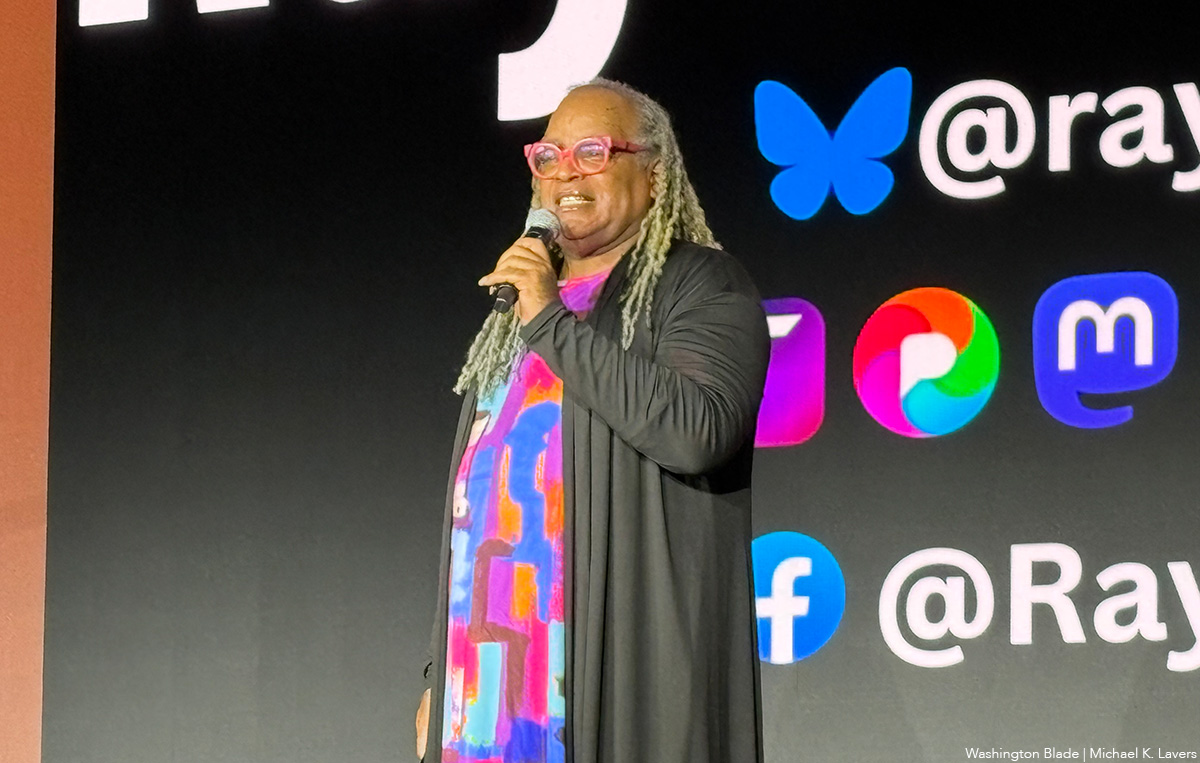
LGBTQ groups in D.C. and elsewhere plan to use Black History Month as an opportunity to commemorate and celebrate Black lives and experiences.
Team Rayceen Productions has no specific events planned, but co-founder Rayceen Pendarvis will attend many functions around D.C. this month.
Pendarvis, a longtime voice in the LGBTQ community in D.C. moderated a panel at Dupont Underground on Feb. 8. The event, “Every (Body) Wants to Be a Showgirl,” will feature art from Black burlesque artists from around the country. Pendarvis on Feb. 23 will attend the showing of multimedia play at the Lincoln Theatre that commemorates the life of James Baldwin.
Equality Virginia plans to prioritize Black voices through a weekly online series, and community-based story telling. The online digital series will center Black LGBTQ voices, specifically trailblazers and activists, and contemporary Black queer and transgender people.
Narissa Rahaman, Equality Virginia’s executive director, stressed the importance of the Black queer community to the overall Pride movement, and said “Equality Virginia is proud to center those voices in our work this month and beyond.”
The Capital Pride Alliance, which hosts Pride events in D.C., has an alliance with the Center for Black Equity, which brings Black Pride to D.C. over Memorial Day weekend. The National LGBTQ Task Force has no specific Black History Month events planned, but plans to participate in online collaborations.
Cathy Renna, the Task Force’s director of communications, told the Washington Blade the organization remains committed to uplifting Black voices. “Our priority is keeping this at the forefront everyday,” she said.
The D.C. LGBTQ+ Community Center is also hosting a series of Black History Month events.
The D.C. Public Library earlier this year launched “Freedom and Resistance,” an exhibition that celebrates Black History Month and Martin Luther King Jr. It will remain on display until the middle of March at the Martin Luther King Jr. Memorial Library at 901 G St., N.W.
District of Columbia
U.S. Attorney’s Office drops hate crime charge in anti-gay assault
Case remains under investigation and ‘further charges’ could come

D.C. police announced on Feb. 9 that they had arrested two days earlier on Feb. 7 a Germantown, Md., man on a charge of simple assault with a hate crime designation after the man allegedly assaulted a gay man at 14th and Q Streets, N.W., while using “homophobic slurs.”
But D.C. Superior Court records show that prosecutors with the Office of the U.S. Attorney for D.C., which prosecutes D.C. violent crime cases, charged the arrested man only with simple assault without a hate crime designation.
In response to a request by the Washington Blade for the reason why the hate crime designation was dropped, a spokesperson for the U.S. Attorney’s office provided this response: “We continue to investigate this matter and make no mistake: should the evidence call for further charges, we will not hesitate to charge them.”
In a statement announcing the arrest in this case, D.C. police stated, “On Saturday, February 7, 2026, at approximately 7:45 p.m. the victim and suspect were in the 1500 block of 14th Street, Northwest. The suspect requested a ‘high five’ from the victim. The victim declined and continued walking,” the statement says.
“The suspect assaulted the victim and used homophobic slurs,” the police statement continues. “The suspect was apprehended by responding officers.”
It adds that 26-year-old Dean Edmundson of Germantown, Md. “was arrested and charged with Simple Assault (Hate/Bias).” The statement also adds, “A designation as a hate crime by MPD does not mean that prosecutors will prosecute it as a hate crime.”
Under D.C.’s Bias Related Crime Act of 1989, penalties for crimes motivated by prejudice against individuals based on race, religion, sexual orientation, gender identity, disability, and homelessness can be enhanced by a court upon conviction by one and a half times greater than the penalty of the underlying crime.
Prosecutors in the past both in D.C. and other states have said they sometimes decide not to include a hate crime designation in assault cases if they don’t think the evidence is sufficient to obtain a conviction by a jury. In some instances, prosecutors have said they were concerned that a skeptical jury might decide to find a defendant not guilty of the underlying assault charge if they did not believe a motive of hate was involved.
A more detailed arrest affidavit filed by D.C. police in Superior Court appears to support the charge of a hate crime designation.
“The victim stated that they refused to High-Five Defendant Edmondson, which, upon that happening, Defendant Edmondson started walking behind both the victim and witness, calling the victim, “bald, ugly, and gay,” the arrest affidavit states.
“The victim stated that upon being called that, Defendant Edmundson pushed the victim with both hands, shoving them, causing the victim to feel the force of the push,” the affidavit continues. “The victim stated that they felt offended and that they were also gay,” it says.
-

 Virginia3 days ago
Virginia3 days agoMcPike wins special election for Va. House of Delegates
-

 New York5 days ago
New York5 days agoPride flag removed from Stonewall Monument as Trump targets LGBTQ landmarks
-

 Florida5 days ago
Florida5 days agoDisney’s Gay Days ‘has not been canceled’ despite political challenges
-

 Philippines5 days ago
Philippines5 days agoPhilippines Supreme Court rules same-sex couples can co-own property

